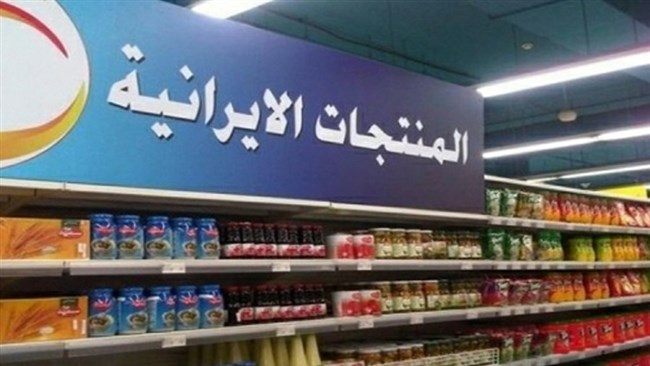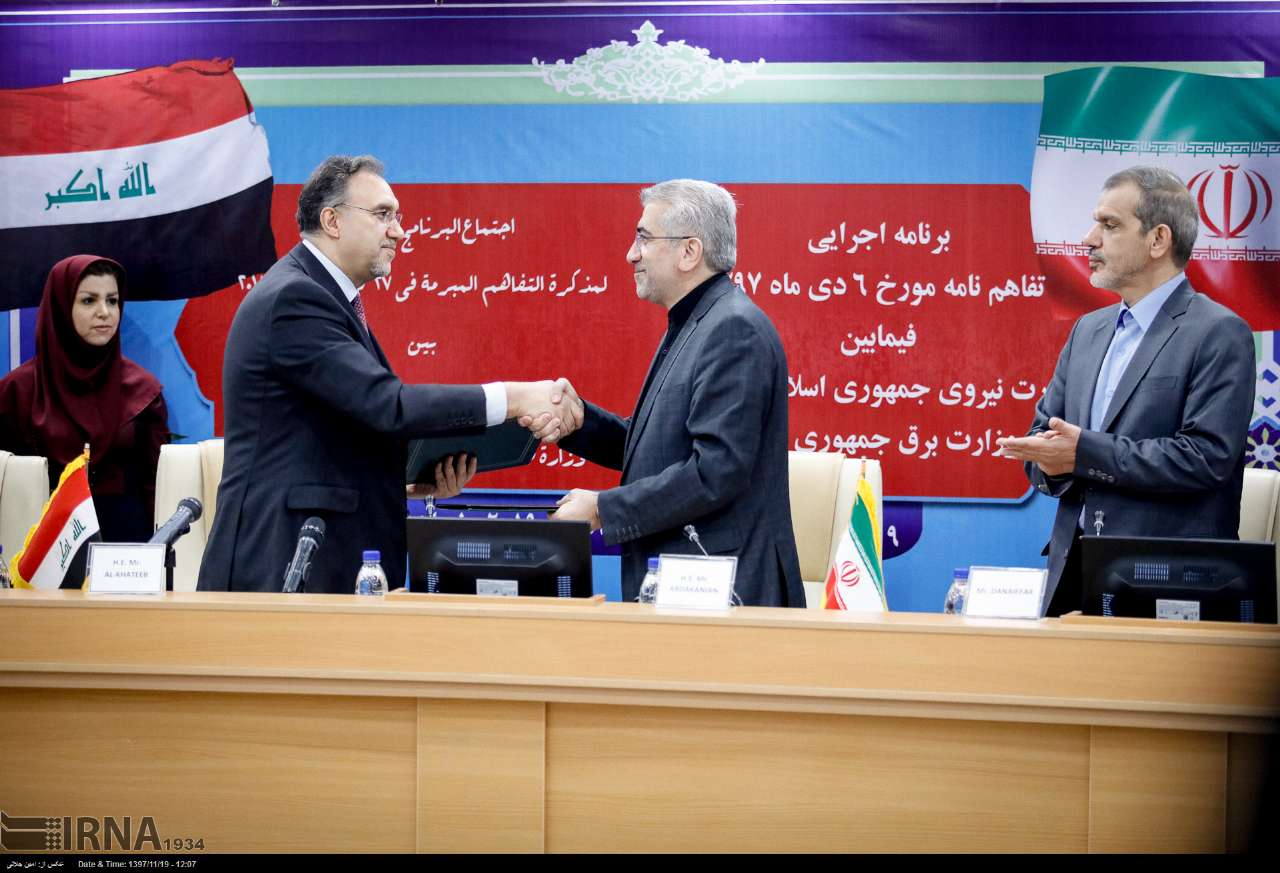Iranian President Hassan Rouhani is due in Iraq on Monday in his first visit to the neighbouring Arab country since he took office in 2013. The landmark visit if significantly important as the two nations set eyes on increasing their bilateral trade to up to 20 billion dollars and snatch away economic and political initiatives from the US.
Rouhani’s official three-day visit sends strong economical and political messages to the world at a crucial time when the US is hard at work to isolate Iran. Before the Iranian president sets foots in Baghdad’s International Airport at daylight and not at a remote airbase in the dark, there’s been a flurry of Iranian and Iraqi authorities visiting each country, such as Iraqi President Barham Salih who met his Iranian counterpart last November, Iranian Foreign Minister Mohammad Javad Zarif, who toured the country for five straight days, Iranian Oil Minister BIjan Zanganeh, Central Bank of Iran Governor Abdolanaser Hemmati, Iraqi Parliament Speaker Mohammed al-Halbousi and other top officials.
A large high-level business delegation from Iran Chamber of Commerce, Industries, Mines and Agriculture (ICCIMA) as well as several local chambers of commerce presidents, headed by Gholam Hossein Shafei, ICCIMA president, is accompanying Rouhani. 30 top Iranian businessmen and women are also expected to hold business-to-business (B2B) meetings with Iraqi economic operators. The Iran Chamber of Commerce delegation travelled to Iraq in January accompanying Zarif and proposed joint ventures and Free Trade Agreeemnt (FTA) to strengthen trade between the two counties.
The Iranian president will talk business mostly as Iran has managed to grab a big slice of the Iraqi market since the fall of last Iraqi dictator Saddam Hussein in 2003. Their current bilateral trade stands at 12 billion dollars per year with non-oil exports worth $8.3 billion. The rest is Iranian gas and electricity that feed the western neighbour’s power stations and its rising electrical demand especially as summer approaches.
Iraq was the second top importer of Iranian goods after China during the last 10 months (20 March, 2018-20 January 2019), according to figures released in February by the Islamic Republic of Iran Customs Administration (IRICA). However, exports of non-oil commodities to Iraq increased 53.2% in tonnage and 44.75% in value during the period in comparison to the same time last year.

Iranian products section at a supermarket in Iraq (Photo: IRNA)
Liquified Natural Gas (LNG), steel and iron products, vegetables such as tomato, potato and various kinds of lettuce are the main Iranian exported items to Iraq’s nearly 40-million-strong market.
Recently, the first Iranian exports consortium was opened in the Iraqi capital Baghdad. Iran’s commercial attache in Iraq Naser Behzad says the consortium, backed by Industrial Parks Company of the Qazvin Province, 150 kilometers northwestern of the capital Tehran, will be used to sell Iranian raisin.
Medicine & medical equipment
Iraq also buys 25 million dollars worth of medicine and medical equipment from Iran each year, according to Iran Food and Drug Administration (IFDA) President Mahdi Pirsalehi who believes this amount can reach $200 million.
There are over 120 Iranian medicine in the neighbouring country, he says. Also, Iraq imports facial makeup products worth 80 million dollars, according to the official.
Gas and electricity
As US has been focusing on Iran’s energy sales in his latest push to bring them to zero, the country’s energy exports to the neighbouring Iraq makes up one quarter of their bilateral trade. Baghdad imports two billion dollars worth of gas from Iran to feed its energy-starved power plants, according to Iranian Petroleum Minister Bijan Zanganeh.
Iran has been exporting 1,200 megawatts of electricity to its Arab neighbour. Tehran and Baghdad renewed the deal last month during a meeting between Iranian Power Minister Reza Ardakanian and Iraqi Electricity Minister Luay al-Khatteeb. The power is exported through three transmission lines in Basra, Diyala and Amara that connect Iraqi grid to the Iranian power lines. A short hiatus in Iranian power exports to Iraq last summer caused mass violent protests in the Iraqi border city of Basra. Iraq can’t afford renewed unrest over power shortages.

Iraqi Electricity Minister, Luay al-Khateeb (left) shakes hands with Iranian Energy Minister Reza Ardakanian following renewing Iran-Iraq power agreement in Tehran (Photo: IRNA, Amin Jalali)
Iran’s power export to Iraq dates back to 2005 when under the first deal Iran agreed to send supply 150 megawatts of electricity to the neighbouring country.
Also, Iran has plans to reconstruct Iraq’s heavily-damaged electric power industry during the next three years, the country’s energy minister says as Tehran eyes investing heavily in the Arab country’s infrastructure in post-war era.
“ٌWe are planning to play the principle role in reconstructing Iraq’s electric power industry in a three-year plan,” Iran Energy Minister Reza Ardakanian was cited as saying by the Iranian Tasnim News Agency.
Tehran’s rush to be a powerful operator in Iraq’s electrical industry is part of Iran’s "power diplomacy" that aimed to turn the Middle Eastern country into an energy hub and reach other regional countries through Iraq. Iran has been also supplying power to its neighbours such as Iraq, Afghanistan, Pakistan and Armenia. The state firm Iran Power Generation and Transmission Company (Tavanir) says it’s ready to increase the current amount for all of these countries two-fold.
Iran has also been building several power plants in Iraq aimed at offsetting the country's energy needs by Iranian-made equipment that have challenged their European and US rivals. Earlier, Alireza Kolahi, Vice President of Iran-Iraq Joint Chamber of Commerce told Iran Chamber Newsroom that Iranian public and private firms have been actively generating electricity for residents of the Iraqi capital Baghdad as well as the city of Najaf.
Watch video: Alireza Kolahi tIran-made plants already supplying power to Iraq
The reimposed US unilateral sanctions that took effect last August and November have hard strangulated Iran’s access to international financial markets and heavily cut banking ties with the country. That’s why Tehran has been in talks with its top trade partners to open a non-dollar monetary channel to keep bilateral commerce afloat. Iraq has been the latest success story. During CBI Governor Hemmati’s visit to Iraq last month, Tehran and Baghdad agreed to open euro and dinar accounts to clear outstanding debts and future transactions.
The two sides have also agreed to build a free trade zone on their border to expand economic ties. "We care about our relationship with Iran," Iraqi President Salih said following the announcement.
Rouhani is also expected to lay out the groundwork for building a 40-kilometer railway that connects the Iranian city of Khorramshahr to the Iraqi Basra. The project would hugely increase and facilitate trade as well as further promote tourism.
Tourism
Iraqis topped the list of foreign tourists that visited Iran in 2017. Three million Iraqis visited the country that year, that is 75% of all foreign tourists that travelled to Iran two years ago, according to Hassan Danaifar, secretary of the committee to develop Iran’s economic relations with Iraq and Syria. Many Iraqis are the tourists who flock to the country to seek medical help as Iran has made huge advances in medicine in recent years.
In a bid to encourage more Iraqis to travel to Iran, private airline Oxin Arvand is expected to start direct flights to and from Arvand Free Zone on the Iran-Iraq border. Also, Iraqi tourists that enter the country through this region can travel to the Persian Gulf island of Kish via Abadan without any visas.
Road to Syria passes through Iraq
Rouhani's official visit is very important in working out details of land and rail connections to Syria through Iraq. However, raging battles against the IS terrorists at the Iraqi-Syrian border is a big obstacle. Iraqi Popula Mobilisation Units, also known as Hashd al-Shabi, as well as US forcces and Syrian Kurds are all zeroing in on the very last pocket of the terrorist group.
Iran eyes faster transit of its goods and commodities to Syria through the Iraqi land to cut short the distance and reduce costs. Keyvan Kashefi, President of the Iran-Syria Joint Chamber of Commerce, earlier told Iran Chamber Newsroom that such land and rail connections between Iran and Syria through Iraq will open "soon".
Connecting Syria's railroad to Iranian and Iraqi railways are also among Damascus' priorities as part of the country's strategic framework to forge ties with neighboring states, according to Syrian Transport Minister Ali Hammoud. He said a 32-kilometer railroad is required to be built by Iraq to connect Shalamcheh in western Iran to Basra's railway in southwestern Iraq and from there to Kerbala (central Iraq) and finally northern Iraq.
He noted that once the construction of the railroad is completed, Iraqis will be able to travel to different parts of Iran and Syria and exchange goods with Syrian cities, including the port of Latakia. The rail connection will also link Iran's Persian Gulf to the Mediterrenean Sea.
Bilateral political unity
The Iranian president is also scheduled to meet Ayatollah Ali al-Sistani, the top Shia religious authority in the holy city of Najaf. The meeting is highly important as Ayatollah Sistani, along with top Iraqi authorities, had harshly criticised US President Donald Trump following his annoucement that he will keep some of US troops in the Arab country to "watch Iran". He stressed that Iraq aims to have harmonious relations with all its neighbouring countries, Iran included, without interference in its internal affairs. Iraqi President Barham Salih and Prime Minister Adil Abdul-Mahdi all joined the Grand cleric in condemning Trump's plans to use thier land as a "launchpad" for attacking other states.
The Iranian president’s upcoming historic visit will also send a very a strong message to the US and its regional allies that have been going all the way out to curtail Iran’s regional influence and significantly reduce the country’s energy sales. Although the two neighbours, who share deep historical roots, have gone through rocky relations during the past century, they’re “brothers with an inseparable unity”, as put it Iranian Foreign Minister Zarif during his last visit to Iraq.